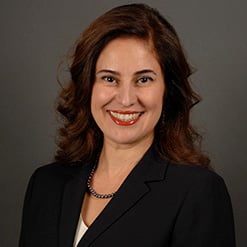University of Colorado Cancer Center member Maryam Asgari, MD, MPH, is one of nine CU School of Medicine faculty members to be awarded an Anschutz Acceleration Initiative grant. The winning projects, announced in January, were chosen for their promise to deliver life-changing advancements in medicine within the next three to five years.
“Creating an environment where our faculty and staff can thrive and use their knowledge and hard work to benefit others is one of the most important responsibilities of leadership at our school and on our campus,” said John J. Reilly Jr., dean of the CU School of Medicine, when announcing the awardees. “We had so many worthy projects to consider that we still have work to do to attract support for them too. We build a stronger school by supporting one another.”
Identifying a high-risk population for skin cancer
With her Anschutz Acceleration grant, Asgari, professor and chair of the Department of Dermatology, will test a skin cancer screening program that uses a validated skin cancer risk prediction tool that combines genetic and clinical risk factors to identify individuals at high risk for skin cancer. Asgari and her fellow researchers — including CU Cancer Center members Cathy Bradley, PhD; Lori Crane, PhD, MPH; and Russell Glasgow, PhD — also will examine the tool’s efficacy in reducing skin cancer-related outcomes. The results of the research are likely to impact patient care in the next five years by identifying a high-risk subgroup for which skin cancer screenings could yield clear, direct benefits, including reduction in morbidity and mortality.
“Skin cancer is the most common type of cancer in the U.S., and Colorado has one of the highest per-capita rates of skin cancer in the country,” Asgari says. “For Coloradans, environmental risk factors, such as our altitude and climate that exposes us to high levels of UV light, combined with our outdoor-focused lifestyle, puts our residents at increased risk for skin cancer. And skin cancer is on the rise in Colorado.”
Better data for better recommendations
Currently, the United States Preventive Services Task Force (USPSTF) — the medical body that makes evidence-based recommendations about clinical preventive services including cancer screenings — has no official recommendation for skin cancer screenings, due in part to the fact that not enough evidence exists to assess the balance of benefits and harms of a visual skin examination to screen for skin cancer.
Asgari hopes her research will help change that, giving the USPSTF the data it needs to create an official recommendation for skin cancer screening. Her study will enroll current participants in the Colorado Biobank — a biorepository created in partnership with UCHealth and the University of Colorado Anschutz Medical Campus to facilitate research and discoveries in personalized medicine — and will randomize half of the high-risk individuals to a skin screening and the other half to no screening. Asgari will seek to evaluate the impact of the intervention on patient-, care-, and system-related outcomes.
A research dream come true
In April 2023, in an invited editorial for the Journal of the American Medical Association introducing the revised USPSFT Skin Cancer Screening guidelines, Asgari and Crane argued for the importance of identifying high-risk subgroups in order to lower rates of skin cancer in the U.S.
“Recent genome-wide association studies have identified genetic risk factors associated with skin cancer and have used risk loci to create polygenic risk scores,” Asgari and Crane wrote in the editorial. “Polygenic risk scores, combined with established nongenetic risk factors, have been used to predict disease risk across a wide variety of diseases. A combination of polygenic risk scores and clinical and environmental risk factors can be used to identify high-risk skin cancer subgroups for whom screening could show definitive morbidity and mortality benefit. Given that genetic risk is currently integrated into breast cancer screening guidelines, integrating genetic risk into skin cancer guidelines appears to be a plausible option.”
With her Anschutz Acceleration Initiative Award, Asgari is now able to take steps to make that plausible option a reality.
“When I wrote that editorial, I had not imagined that I would actually have the resources to do the type of study I was proposing,” Asgari says. “The fact that the Anschutz Acceleration Award will enable what I had outlined as the necessary next step in changing skin cancer screening guidelines is a dream come true. I hope the findings from our study will shape the way skin cancer screening is delivered on a national scale.”




